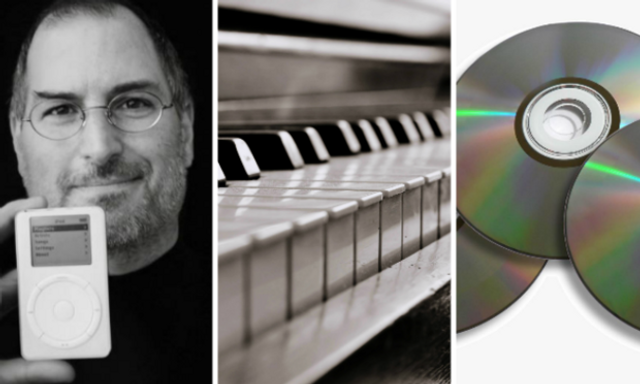To say that music has come a long way over the last twenty years is something of an understatement; the advancements in music technology and accessibility since the dawn of the Internet has been nothing short of astounding.
That said, it's also true to say that it has been a journey to get to this point, where you can store your entire music collection on a small device that you can keep in your pocket and carry around with you. Would we have had the iPod without Thomas Edison, for example?
With that in mind, we've rounded up the most pioneering advancements in music below.
1) 15th CENTURY: THE PRINTING PRESS

Photo credit: The International Printing Museum Carson, CA
We know, we know – it's an odd one to start with. What does the printing press have to do with music? Surely it's had a bigger impact on the history of literature? That may be true, but before the first printing press was invented c. 1440 by Johanes Gutenburg (a recreation of which can be seen above, via Wikipedia) music was passed around only by word of mouth and handwritten pages. By allowing sheet music to be printed and mass circulated during the Renaissance, it was a game-changer.
**
2) 1700: THE PIANO
.jpg)
Musical instruments have existed for thousands of years, with evidence of string and woodwind instruments like flutes, harps and percussive instruments even uncovered in Ancient Egypt - but the invention of the piano around 1700 changed everything. Although there had pipe organs and harpsichords and other keyboard-based instruments before it, Italian instrument-maker Bartolomeo Cristifori struck gold with his invention. been Imagine how drab classical music would have been without some of the greatest compositions we've ever known on piano? Would jazz have existed without the versatility of an instrument like the piano?
**
3) 1877 – 1892: THE BIRTH OF THE PHONOGRAPH AND THE COMMERCIAL GRAMOPHONE

The phonograph, later developed as the gramophone, was the first-ever device invented for the purpose of mechanical sound recording and reproduction. Other inventors had made machines that could record sound, but Thomas Edison (above) was the first to figure out how to reproduce it. The first-ever phonograph was unsurprisingly quite a cumbersome device, but nevertheless, it allowed music to be played via a stylus and a foil sheet wrapped around a cylinder. The commercial gramophone, invented in 1892, allowed the ordinary Joe Soap to experience recorded music in their own home. The fact that vinyls and turntables, as they're now known, remain popular to this day speaks volumes.
**
4) EARLY 20TH CENTURY: THE DAWN OF COMMERCIAL RADIO BROADCASTING

Today, we take radio broadcasting for granted; flick a switch, turn a dial and you have any number of radio stations, genres and voices to choose from – even moreso with the dawn of the digital radio age, where you can tune in to a station from California or Kazahkstan, if you so wish. But in the early 20th century, we were still getting to grips with the idea of radio broadcasting. In short, the development of the thermionic valve by English physicist John Fleming eventually led to people and early radio stations all over the world beginning to make their voices known by about 1920. Gugliemo Marconi (above) is also credited as a pioneer in wireless telegraphy for his work in the late 19th/early 20th century, and is often referred to as the inventor of radio.
**
5) 1931: THE ELECTRIC GUITAR

Music without electric instrumentation would be rather... well, let's be honest – it'd be pretty boring. Although various people had dabbled in finding a way to amplify their instruments in the early 20th century, the first electric guitar was officially designed in 1931 by George Beauchamp. He partnered with Adolph Rickenbacker to form the Rickenbacker Electro Stringed Instrument Company in 1934, and they were granted a patent in 1937. The Fender Stratocaster, possibly the most iconic of all guitars, was designed and manufactured in 1954, and the rest, as they say, is history – paving the way for electric bass guitars, Put simply, rock 'n' roll wouldn't have existed without the electric guitar. And we all know that rock 'n' roll changed the world.
**
6) 1970: THE INVENTION OF THE COMPACT DISC

CDs may not be the celebrated music format they once were, but there is no denying that they had a major impact on music. The clue is in the name: they were a compact way of transporting and listening to your music, offering a pristine, crystal clear antidote to the crackle and hiss of vinyl records – and you didn't have to get up and turn over to Side B as you would with a record or a cassette, either. The first CD prototype was invented by James Russell in the 1960s; he was granted the patent in 1970 and Phillips and Sony licenced it in the 1980s, bringing it to the mass market. It undoubtedly paved the way for hi-fi definition when it came to consuming music. Let's just not mention the Mini-Disc...
**
7) 1999: NAPSTER & DIGITAL DOWNLOADS

In 1999, the Internet was still reasonably young and many people were still getting used to having this wealth of information at your fingertips - and in your own house! On your own computer! Imagine, then, that instead of waiting to tape your favourite song off the radio or y'know - going out and buying it – you could simply click a button and have it within minutes (or, depending on your dial-up connection, hours). Napster only ran for two years and was intended by its inventors Shawn Fanning, John Fanning and Sean Parker to enable the easy filesharing of MP3s between users before it was shut down by court order in 2001. Of course, let's remember that it hasn't necessarily been a good thing for the music industry and music piracy is essentially theft – many have argued that it has decimated the industry irrepairably - but in terms of allowing people access to a wealth of songs, it opened up a new world (and a can of worms, in the process).
**
8) 2001: THE IPOD & ITUNES

Steve Jobs has had his critics over the years, but one thing that he incontestably got right was the iPod. There had been MP3 players before it, but none quite like the iPod - and none with the user-friendly interface of iTunes, either. Invented by a team led by Jon Rubinstein and including Jonathan Ive, Apple's era-defining music device was a work of genius: a small, phone-sized machine that could hold thousands of songs in one place, at your fingertips, and with such a sleek design. The convenience was astounding and although it's been 15 years since the first iPod was released, and the concept continues to blow our minds. These days, the technology has advanced significantly and you can now only buy the iPod's cousin, the iPod Touch – but the original will always hold a special place in our hearts.
**
9) 2010s – THE STREAMING ERA

If there's one thing that the 2010s will become known for in terms of pioneering advancements in music, it's streaming. The advancement of the Internet, wireless technology, speed and bandwidth has meant that streaming companies like Spotify can now offer music fans like you and I all of the music we could possibly want (alright, then – most) without having to go to the trouble of downloading it first. Yes, it appears that humans are that lazy. In recent years, the likes of Apple Music, TIDAL, Deezer, Pandora and more have joined the fray so as much as flag-bearers of the physical product (and musicians/record labels, too) may protest, it seems like music streaming is the way forward.
Considering how far we've come in the last century alone, possibilities for the future of music are nothing short of dazzling.










































































